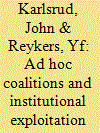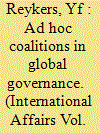| Srl | Item |
| 1 |
ID:
174551


|
|
|
|
|
| Summary/Abstract |
While the increasingly thick web of global, regional and sub-regional security arrangements and institutions has received ample scholarly attention, the phenomenon of ad hoc military coalitions and how they impact these institutions has been relatively little explored. We examine ad hoc coalitions in international security responses and develop a tentative typology of military responses that takes ad hoc coalitions into consideration, where we differentiate in terms of institutionalisation and duration. Following a rational-choice institutionalist logic, we argue that institutional proliferation increases the chances of institutional exploitation. We illustrate this with how states apply a pick-and-choose approach in which institutional products but not frameworks are used. They use the interoperable forces, a common culture and mainstreamed doctrine, but not the formal deployment of rapid response mechanisms of eg the North Atlantic Treaty Organization and the African Union. In closing, we observe that institutional proliferation in international security facilitates a functionalist approach mainly inspired by national self-interest. Future research should examine whether this could result in dwindling relevance of international institutions, first in the domain of security, but later also in other domains.
|
|
|
|
|
|
|
|
|
|
|
|
|
|
|
|
| 2 |
ID:
191729


|
|
|
|
|
| Summary/Abstract |
Ad hoc coalitions (AHCs) are an indispensable but scantly conceptualized part of global governance. In recent years, several typologies and classifications of global governance arrangements have been provided, mostly differentiating them based on their organizational design features of degree of formality and membership composition. These do not capture AHCs and the role they play in global governance. In this article, we not only provide a conceptualization of AHCs, but also propose ways in which AHCs fit within the broader global governance architecture. We argue that what sets AHCs apart is not so much their (in)formality or membership, but rather their short-notice creation, their task-specific purpose and their temporarily circumscribed existence. We therefore define AHCs as autonomous arrangements with a task-specific mandate established at short notice for a limited time frame. We then develop a research agenda on the nature and future of AHCs, including their short- and long-term relationship with other multilateral arrangements in the global governance architecture. This is important, as we do yet not know how AHCs complement, compete and impact on international organizations and international crisis response.
|
|
|
|
|
|
|
|
|
|
|
|
|
|
|
|
| 3 |
ID:
193835


|
|
|
|
|
| Summary/Abstract |
How is multipolarity impacting on UN peacekeeping operations? This article sets out to answer this question by examining the ongoing decline in UN peacekeeping operations and the concurrent rise of regional and ad hoc coalitions in an era of increasing geopolitical competition. The article argues that coalitions have significantly less focus on human rights, international humanitarian law, and the protection of civilians. They thus represent a shift away from the liberal values that have marked UN peacekeeping operations, and are coherent with current geopolitical shifts where China is chipping away at human rights at the UN and African states are increasingly voicing a need for more robust operations. The article concludes that the likely outcome of these trends is a continued decline of UN multidimensional peacekeeping, but that coalitions may receive logistical and administrative support from the UN peace operations machinery.
|
|
|
|
|
|
|
|
|
|
|
|
|
|
|
|